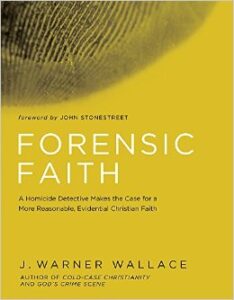How you know that what you believe is in fact true? “Everyone has their own views of truth and of God!” That is a common mantra in our pluralistic and sophomoric views of the Good the True and the Beautiful. But is it right? Is there a path to follow, a way to get us to the truth, if such a thing even exists? Or are we condemned to walk in spiritual darkness and indifference? In this post and podcast interview, we examine the question of truth in religion head on. Joining me in is J. Warner Wallace to help us on this journey.
Jim Warner Wallace is a cold-case homicide detective who was conscientious and a vocal atheist through his undergraduate and graduate work in Design and Architecture (CSULB and UCLA); he always considered himself to be an “evidentialist”. His experience in law enforcement only served to strengthen his conviction that truth is tied directly to evidence. But at the age of thirty-five, J. Warner took a serious and expansive look at the evidence for the Christian Worldview and determined that Christianity was demonstrably true. After becoming a Christ follower in 1996, Jim continued to take an evidential approach to truth. He eventually earned a Master’s Degree in Theological Studies from Golden Gate Baptist Theological Seminary and teaches as a professor today at Biola University. He is also the author of many books.
This is Part 2 of 2
In this podcast interview, I ask Jim the most important question I can ask about the fundamental foundations of my life, the question of truth. If what I believe about my health, my wife, my children, my financial accounts and my eternal soul and God, is not in fact true then it is nothing more than what Freud called wishful thinking. I may as well eat drink and be happy in my own self-imposed delusion: embracing pragmatism and possibly hedonism. So then how do we determine truth?
Some ideas are contradictory, some are impossible to disprove, and some are hard to give up. Religious beliefs are like that but so are naturalism or scientific materialism. It is also possible to have a false belief that works for you like a cult would. There are many ways to consider the truthfulness of an idea or theory as religion is one as well. Lets consider the great religious leaders, whether he be Jesus, Moses or Muhammad, or Joseph Smith, we need to look at their life style to see if they really are who they claim to be.
James J. Warner Wallace has named three things to watch out for in the founder of a religion. Why did he start it? Was it to increase his political power? Was it to have more sexual partners? Was it to amass more wealth? Or was it to really serve God and humanity? These three are a clue that this religion is questionable, if its founder is found to have these elements in increasing amounts in his life.
They are:
- The obsessive desire of the sensual: lust
- The obsessive desire for wealth: Greed
- The obsessive desire for power: Political Dominance
But you will have to listen to the interview to see how this would work!
Check these wonderful books for your “truth” library.
Podcast: Play in new window | Download





